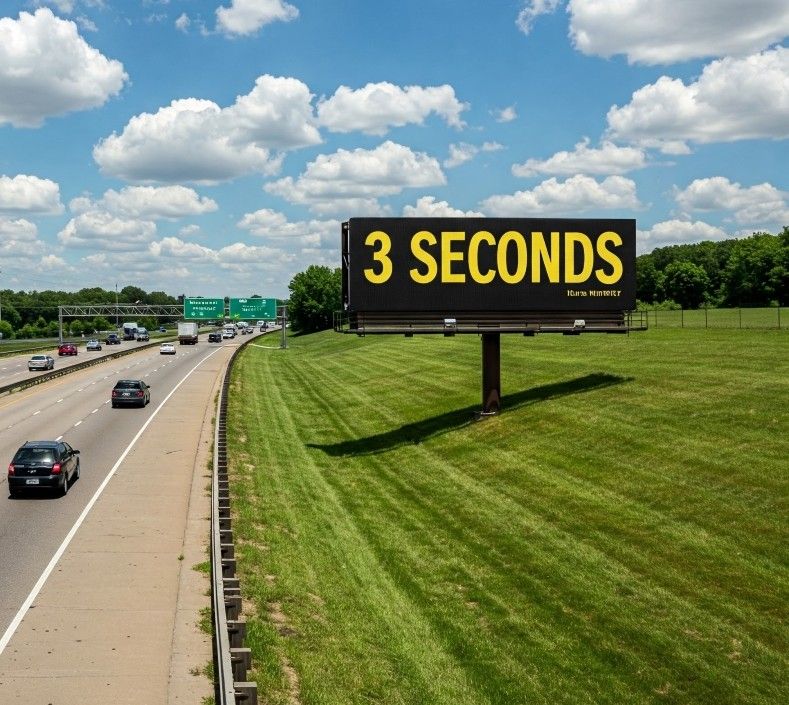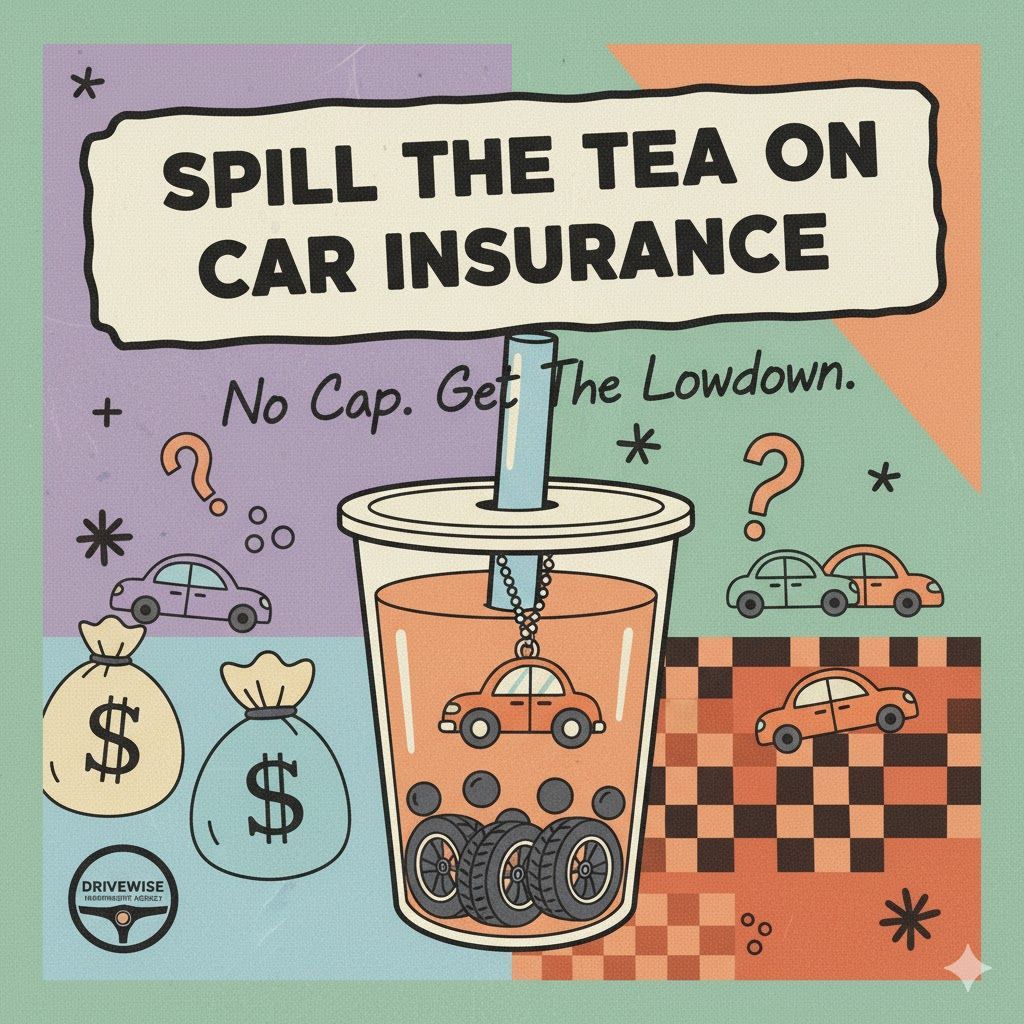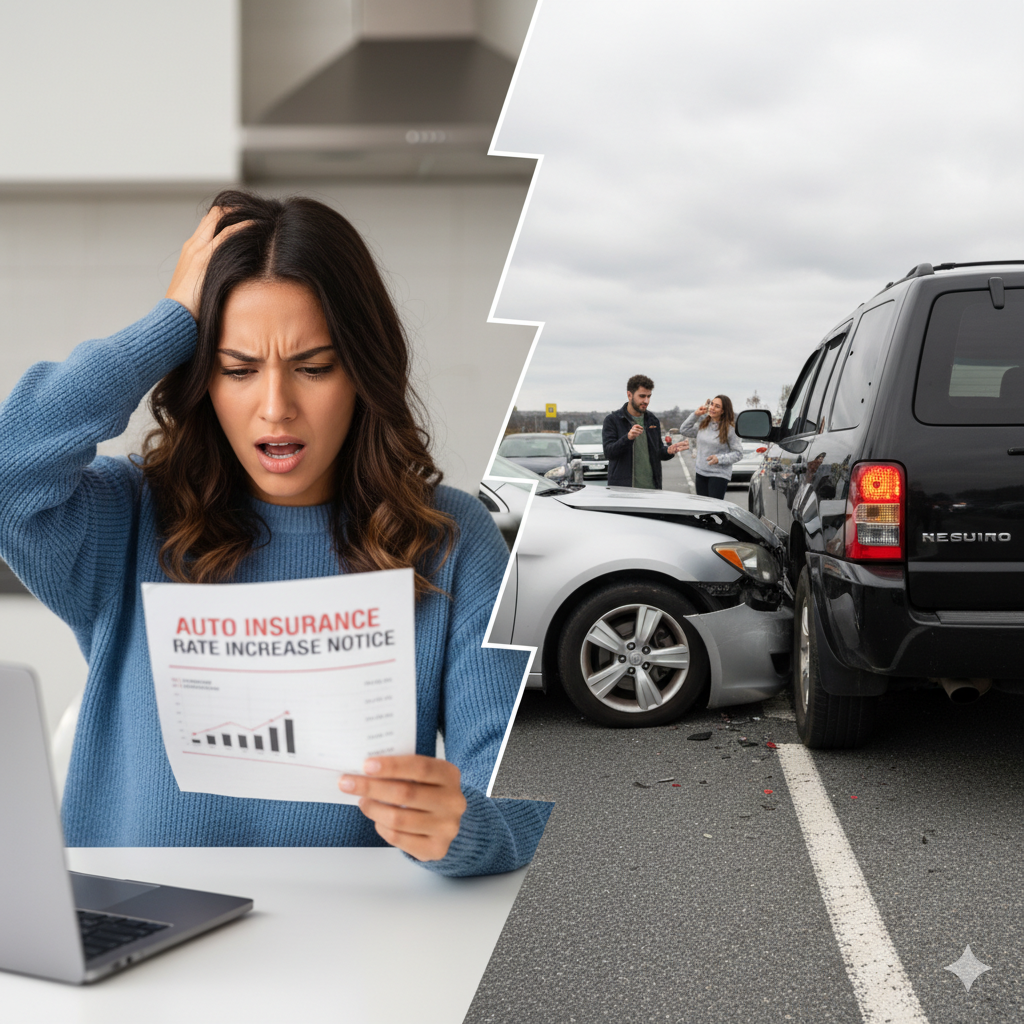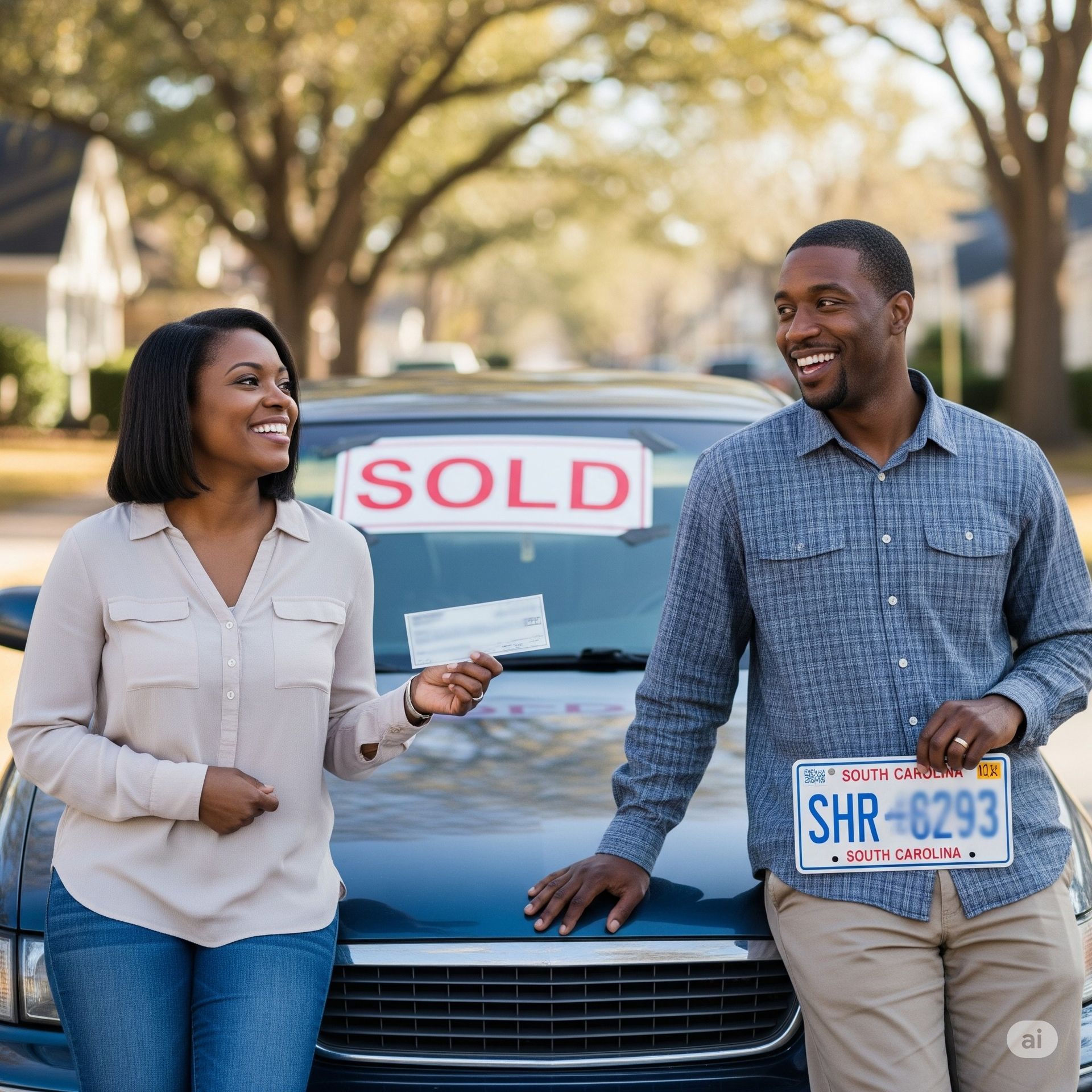3 Seconds: The Time It Takes to Realize You've Ruined Your Day
Doug Stockman • April 9, 2025
The Time It Takes to Say "Oops, I Probably Shouldn't Have Done That"

TL;DR: The 3-Second Rule: Why It's Not Just a Suggestion (And Why You're Not Vin Diesel).
Three seconds is NOT an eternity: It's the buffer you need to avoid turning your car into a metal pancake.
"Pro" drivers are delusional: Physics doesn't care about your ego; it cares about stopping distances.
It's simple: Pick a point, count "one Mississippi, two Mississippi, three Mississippi." If you pass it too soon, back off.
Those seconds give you time to process, react, and let your car do its thing.
Chill out, count, and avoid awkward insurance conversations. Driving isn't a race, it's a shared journey to avoid metal-on-metal crime.
Three Seconds: The Eternity Between "Oops" and "OH NO."
Let's be honest, three seconds on the road feels like an eternity. Especially when you're stuck behind someone who seems to be navigating too delicately. You're thinking, "Come on, buddy, I could knit a sweater in three seconds!" But, alas, the highway safety supreme being (and your insurance premium) demand we adhere to this seemingly endless time gap.
Both following too closely and texting while driving has added to the number of accidents in South Carolina in recent years.
The "But I'm a Pro!" Delusion
We've all been there. You're a driving ninja. You can parallel park in a space the size of a postage stamp. You know the exact moment to hit the gas to catch that elusive green light. You're basically Vin Diesel, but with a slightly less impressive car and a significantly less impressive physique. So, three seconds? Pfft. Amateur hour. And really, does arriving at your destination 3 seconds later matter? Avoiding the nightmare of claims is definitely worth it. Don't become a South Carolina accident statistic.
"I can react in a nanosecond!" you declare, as you tailgate a semi-truck during a monsoon. "Three seconds is for people who can't tell the difference between a brake light and a Christmas tree."
Spoiler alert: You're wrong. And you're about to learn a valuable lesson in the physics of large, metal objects, sudden stops and metal accordions.
The Reality Check:
Physics Doesn't Care About Your Driving Ego.
Here's the thing:
even if your reflexes are lightning-fast, your car isn't. It needs time to respond. And those three seconds? They're not just some arbitrary number a bored traffic engineer pulled out of thin air. They're a buffer. A safety net. A "Hey, maybe don't turn your car into a metal accordion" zone. The 3 second rule works for every speed whether you are traveling at 15 mph or 60 mph.
Imagine this:
the car in front slams on their brakes. Why? Who knows? Maybe a squirrel decided to audition for "American Ninja Warrior" by crossing the highway. Maybe they saw a particularly enticing roadside taco stand. Whatever the reason, they've stopped. Now, you have three seconds (or less, if you're a "pro") to react.
Those three seconds give you:
Time to process:
"Wait, are those brake lights? Are they serious?"
Time to react:
"Okay, foot, move to the brake pedal! Now!" How much time does that take? I tried to calculate the time and it is slow.
Time for your car to react:
"Engaging anti-lock brakes! Please hold while I calculate the optimal stopping distance."
Without those precious seconds, you're just a passenger in a metal projectile, headed for a very expensive collision.
The Actual Technique (Because, You Know, Safety)
For those of you who haven't memorized the driver's manual (and let's be honest, who has? I definitely have not.), here's the lowdown on the three-second rule:
Pick a stationary object:
A sign, a pole, a particularly grumpy-looking squirrel.
When the car in front passes it, start counting:
"One Mississippi, two Mississippi, three Mississippi." I slow this count also.
If you pass the object before you finish counting, you're too close. Back off, buddy. Back. Off.
The Moral of the Story:
Chill Out and Count.
Driving isn't a race. It's a delicate dance of metal, momentum, and the shared desire to get to our destinations without becoming a viral road rage video. So, take a deep breath, relax, and give yourself (and everyone else) a little space.
Have you ever seen a stop light change to green and the car in front of you races to the next light. You can see clearly that the next light ahead just changed to red. Why are we racing to get to it?
Also, if you are following too closely, and can't see what's in front of the car in front of you, be prepared for an accident. If the car in front stops suddenly or moves to another lane to avoid the stopped car in front of it, you won't have enough time to react and hit the stopped car. Several years ago, this happened to me. The 3 second rule works.
Those three seconds might feel like an eternity, but they're the difference between a smooth ride and a very awkward conversation with your insurance agent. And trust me, nobody wants that. And besides that, it is less wear and tear on your car. Following to close, means using your brakes more often. I don't know if you have paid for a brake repair job lately, but it is not cheap.

The TL;DR (No Cap) Car insurance isn't some cheugy boomer paperwork. It’s about protecting your present and future bag. It’s what turns a life-altering financial disaster into a manageable Tuesday. Think of your insurance agent as your hype squad. We're here to explain the tea on deductibles, coverage limits, and make sure you're not paying for a policy that’s mid. The Bottom Line: Don’t simp for a cheaper premium that leaves you exposed. Get the right coverage. Secure your whip. Protect your peace. That's true main character energy. The Tea on Car Insurance: Why Do I Need to Drop Stacks on Something I(hopefully) Won't Even Use? Hey besties. Let's be real. Nobody is stoked about spending their hard-earned cash on car insurance. It feels like one of those things your parents—bless their hearts, they're kind of cheugy—keep telling you is "essential." You’re probably thinking, "Big Yikes, is this even a vibe? Why do I need to drop stacks on something I (hopefully) won't even use?" We get it. You're trying to save your bag, maybe finally afford that drip, or just keep that avocado toast habit alive. But hear us out, because don't simp for cheaper premium, because life without car insurance is seriously not the vibe, and honestly? That’s some major delulu behavior. 🚗 Scenario 1 : You're on Vibe Check Street and Things Go Sideways Picture this: You’re cruising, the playlist is absolutely slapping, and you're feeling like the main character. Then, BAM! A chaotic squirrel runs into the road, you swerve, and now your bumper is looking kinda… mid (or worse, completely busted). Without car insurance, that little "oopsie" instantly becomes a gigantic L. You are now personally funding the body shop, which is an express ticket to Brooksville (population: you). If you have a loan, your lender is going to be shook—and not in a good way. The Insurance Slay: If you have comprehensive and collision coverage, you can low-key just file a claim. You pay your deductible (which is usually much smaller than a whole repair bill), and your insurance company steps in and says, "Bet." Suddenly, that Big Yikes situation is just a minor inconvenience, not a financial dumpster fire. You're winning, which is a big fat W. 💥 Scenario 2 : It Wasn’t You, It Was Karen Okay, so let’s say you are driving perfectly. You have that rizz behind the wheel. But then, some absolute NPC runs a stop sign and totals your whip. What about your car? If the other person has terrible insurance (or, yikes, none), and you only have basic liability, your car is toast, or is it? Would you be getting ghosted by your savings account? The Insurance Slay: If you went for Uninsured(required)/Underinsured Motorist Coverage (which is a total flex), your policy steps up to pay for your stuff (up to the limits) when the other driver is broke or capping about their coverage. You get your ride fixed, you avoid being salty, and you keep the good vibes rolling. What if it is your fault? This is where your Liability Coverage is the real MVP. Legally, you need this at a bare minimum. It means if you are at fault for an accident, your insurance pays for the other person's damages (car repairs, medical bills, etc., up to the policy limits) so that they don't drag you in court and take your house money. Do you have the right limits? Ready to stop being delulu and get a quote that actually slaps? Hit us up. We'll make it quick, easy, and not at all cheugy. Bet! "Yo, need to scoop a quote for car insurance. What's the tea on the cheapest rates for my whip?" Our clients live in Spartanburg, Boiling Springs, Inman, Duncan, Roebuck, Moore, Lyman and the general upstate.

Ugh, My Rate Went Up for a Not-at-Fault Accident? It's the ultimate insurance head-scratcher. You're driving along, minding your own business, and then BAM! Some other driver turns your day into a metal-crumpled mess. But wait, it's not your fault! The police report says so, the other driver's insurance company agrees, and you're feeling pretty good about the whole thing. You and the other driver are not hurt and now your car is fixed. Then you get your renewal notice. Your heart sinks. Your insurance rate has gone up. But…why? Didn't we just establish that you were the innocent bystander in this whole debacle? It's a frustrating, perplexing situation that feels about as fair as getting a parking ticket for a car you don't even own. At Select Source Insurance, we hear this question a lot. We get it, it's maddening. So let's try to demystify this insurance riddle together, one slightly-less-maddening explanation at a time. The Crystal Ball of Risk Insurance companies are essentially professional fortune-tellers. They use all sorts of data to predict who is most likely to file a claim in the future. The "riskier" you appear, the more you're likely to pay for insurance. A not-at-fault accident, while not your fault in the traditional sense, can still be a blip on their risk radar. Here's what they're seeing: You're on the road more. If you're involved in an accident, even if it's not your fault, it indicates you're spending time on the road where these things happen. The more you drive, the higher the chance of being in an accident, even if you are the world's most defensive driver. Driving Habits: Even if you're not at fault, an accident can be a sign of unsafe driving habits. Consider this common scenario: you're following a car too closely, and they suddenly hit their brakes. You manage to stop in time, but the car behind you doesn't, resulting in a rear-end collision. While you may not be considered at fault, your decision to tailgate created a domino effect, leading to the crash. This is just one of many examples of how a lack of attention to safe driving practices can contribute to an accident. Stand Alone: This one incident, in and of by itself, may not impact the rate that much, but if another incident similar or different it will have more impact on the rate. The insurance company starts to see a pattern. The "Luck" Factor. Some insurance companies use a more statistical approach. They see that you've been in an accident, and their data might show that people who have been involved in one accident, even a not-at-fault one, are slightly more likely to be involved in another. It's not a judgment on your driving skills, but a cold, hard, and somewhat comical statistical reality. The Cost of Doing Business. Even in a not-at-fault claim, your insurance company might still have to pay for things. They might cover the rental car while your vehicle is being repaired or towing until they're reimbursed by the other driver's insurance. These costs, however small, are still part of a claim, and claims affect rates. The Solution: We Can Help! So, what's an innocent driver to do? The good news is, you're not stuck. This is precisely where being an independent insurance agency like Select Source Insurance makes all the difference. We aren't tied to a single insurance company. We work with a whole bunch of them! If one company decides to punish you for being a victim of circumstance, we can shop around for you. We can find a different insurance company that has a more favorable view of not-at-fault accidents. Think of us as your personal insurance matchmaker. We know which companies are more forgiving and which ones are more likely to raise rates for even the smallest claim. Our job is to find you a policy that offers great coverage without making you pay for someone else's mistake. The Bottom Line Yes, it's a bit ridiculous that your rates can go up for a not-at-fault accident. It's one of those bizarre insurance quirks that makes you want to shake your fist at the sky. But it's not a dead end. Give us a call. We'll do the shopping and negotiating for you. Let us find you a rate that reflects your driving, not someone else's.

Getting your Spartanburg vehicle tax refund: A guide from Select Source Insurance. Did you sell, trade, or wreck (as in a total loss) your vehicle? Did your vehicle get repossessed, or have you moved out of state? You may be eligible for a refund! We understand that navigating property taxes can be confusing, especially when life events like selling or wrecking a car come into play. Many Spartanburg residents don't realize they might be eligible for a refund on their vehicle property taxes in such situations. At Select Source Insurance, we're here to help clarify the process and ensure you get the refund you deserve. When are you eligible for a refund? Spartanburg County offers vehicle property tax refunds in several instances: Selling, Trading, Wrecking, or Repossessing a Vehicle Returning a Leased Vehicle Moving Out of State before your vehicle tag decal expires Transferring a tag does to another vehicle does not qualify What documentation do you need? The required documentation varies depending on why you are seeking a refund. The Spartanburg County Auditor's Office may require: a Bill of Sale Trade-in agreement A statement from your insurance or repossession company Documentation from the leasing company Your new out-of-state registration. How to apply for your refund? You can apply: in person by email: countyauditor@spartanburgcounty.org. by mail: to the Spartanburg County Auditor's office at 366 N. Church Street, Suite 200, Spartanburg, SC 29303 We're here to help Understanding vehicle property tax refunds can be complex. As your local independent insurance agency, we are here to assist with your car insurance needs and related questions. Here is a link: Spartanburg County Tax Refunds Also, did you know you can turn a vehicle tag in online? Yes, it is called a virtual tag turn in or decommissioning a tag. Here is the link: Decommission a Tag If you have questions about eligibility or need help with documentation, contact Spartanburg County. Informational purposes only. Check with the appropriate government entity for actual process.
